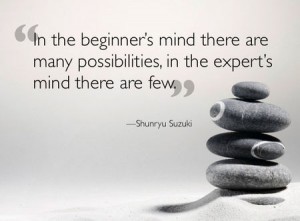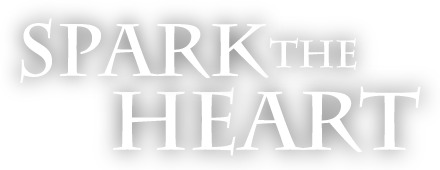
In Zen Buddhism, Beginner’s Mind refers to “having an attitude of openness, eagerness, and lack of preconceptions when studying a subject, even when studying at an advanced level, just as a beginner in that subject would.” (Wikipedia)
Children are a perfect example of living in Beginner’s Mind. They approach every new experience with curiosity and wonder. They have no experience, no expectations. They just show up and try.
As adults, even when we know we are learning something that we don’t know, or attempting to do something we’ve never done, we expect to immediately be good at it.
Often, that expectation of perfection and competence butts up against the deeper knowing that we WON’T be immediately good at it, and so we don’t even make the effort.
How often, as an adult, do you allow yourself to be in a position where you know you won’t be a master? Where you let yourself be taught, encouraged, and allowed to make mistakes? Where you give it your best without having to be perfect?
Several years ago I took a figure drawing class. I had never taken any kind of art class before and had no experience drawing. But I needed to learn about body proportions for some life-sized paper maché figures I wanted to create.
The teacher talked about negative space and movement and I carefully made pencil lines on my newsprint paper. I was easily frustrated, quick to get cranky, and I cried often during the first few lessons because I just couldn’t translate what I saw onto the paper.
And yet I loved the idea of this new way of seeing the human body. So I stuck with it. By the end of the eight weeks, my hand and eyes were making the connection and I even signed up for a second class.
A few years later I wanted to play the cello. The desire seemed to come out of nowhere, but it was a strong calling, so I pursued it. I rented a cello, found a teacher at a local music store and had a lesson every Friday afternoon for an hour.
I had played the alto saxophone and the oboe, both wind instruments, in high school. The cello, a large string instrument, requires the left hand to do one thing while the right hand does another. And the notes are on a completely different staff. I had no idea.
I struggled with the coordination and the foreign scales, transposing the notes from the familiar treble clef to the bass clef. My teacher encouraged me as I squeaked my bow across the strings and finally, I could hear myself improving.
A dislocated finger forced me stop playing after almost a year of lessons, and I actually missed the challenge of getting good at something new.
I remember writing on my I WANT list the year before:
I want to learn something I’ve never done before, even though I know I won’t be very good at it.
I wrote this, KNOWING the uncomfortableness of being a beginner. But also knowing that there is great freedom in being a beginner.
Because you don’t HAVE to know. You don’t have to be brilliant. In fact, you are expected to not be very good.
What if you tried something you’ve never done before and greeted that unknowing, that newness, that imperfection, with curiosity and wonder, without any preconceived expectations of your abilities.
What would you attempt?
Would you bake a peach pie?
Take painting lessons?
Learn how to play a musical instrument?
What if you approached your entire life with Beginner’s Mind?
Please share your ideas by clicking on the Comments below!
